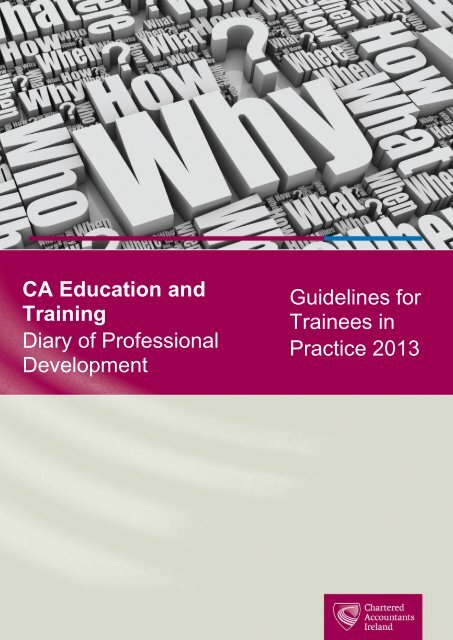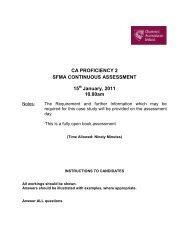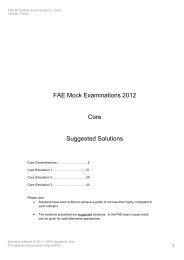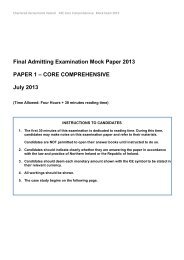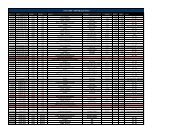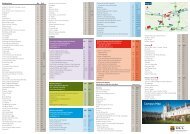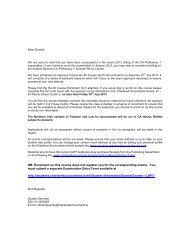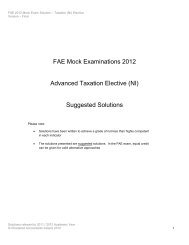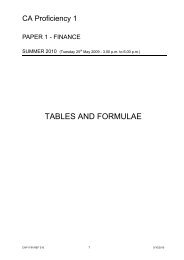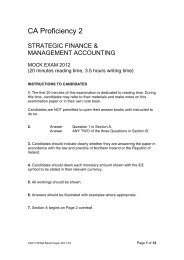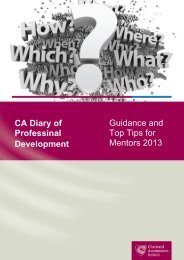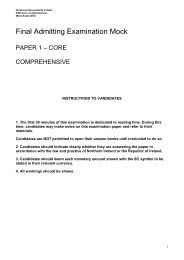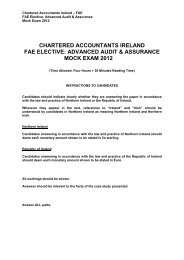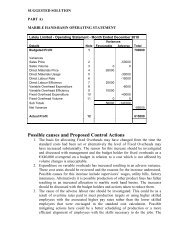CA Professional Development Experience: Guidelines for ... - Student
CA Professional Development Experience: Guidelines for ... - Student
CA Professional Development Experience: Guidelines for ... - Student
Create successful ePaper yourself
Turn your PDF publications into a flip-book with our unique Google optimized e-Paper software.
<strong>CA</strong> Education and<br />
Training<br />
Diary of <strong>Professional</strong><br />
<strong>Development</strong><br />
<strong>Guidelines</strong> <strong>for</strong><br />
Trainees in<br />
Practice 2013<br />
1
Introduction<br />
The International Federation of Accountants (IFAC) defines that the ‘goal of accounting education and experience<br />
must be to produce competent professional accountants capable of making a positive contribution over their<br />
lifetimes to the profession and the society in which they work.<br />
The maintenance of professional competence in the face of the increasing changes they encounter makes it<br />
imperative that accountants maintain an attitude of learning to learn.<br />
The education and experience of professional accountants must provide a foundation of knowledge, skills and<br />
professional values that enables them to continue to learn and adapt to change throughout their professional<br />
lives’.<br />
Chartered Accountants Ireland espouses these goals and is committed to developing high-quality business<br />
professionals.<br />
Competency-led Training<br />
A competency-based qualification process means that the focus is on work outcomes – the tasks and functions<br />
normally carried out by <strong>CA</strong>s in the workplace. The route to qualification is comprised of three processes:<br />
Academic study delivered through the 3 rd level colleges<br />
A period of professional development undertaken under a training contract.<br />
A period of professional education and assessment by the Institute.<br />
The competency-based approach to qualification strengthens the links between the period of professional<br />
development and the education and assessment process. This publication sets out the objectives of the<br />
professional development cycle and the practical experience requirements <strong>for</strong> trainee members of this Institute.<br />
<strong>Professional</strong> <strong>Development</strong><br />
The purpose of the period of professional development is to enable trainee to acquire the following attributes:<br />
1. professional values, personal and interpersonal skills<br />
2. an awareness of the practicalities of the business environment<br />
3. functional competencies<br />
The trainee is required to chart the acquisition of these values, skills and competencies in the Diary of<br />
<strong>Professional</strong> <strong>Development</strong> (the <strong>CA</strong> Diary) throughout the period of their training contract.<br />
2
The <strong>CA</strong> Diary is the official record <strong>for</strong> trainee’s evidencing their acquisition of skills and competencies and<br />
experience at point of admission to membership.<br />
1. PROFESSIONAL VALUES, PERSONAL/INTERPERSONAL SKILLS<br />
(Appendix 1)<br />
On entering into a training contract, each trainee is bound by:<br />
The Bye-Laws which govern the Institute of Chartered Accountants in Ireland<br />
The Code of <strong>Professional</strong> Conduct<br />
The Ethical <strong>Guidelines</strong><br />
Trainees are required to adopt the following professional values<br />
Ethical and professional behaviour<br />
Accountability to the public<br />
<strong>Professional</strong> Ethics<br />
Trainees are being prepared <strong>for</strong> membership of a profession. Accordingly, you should be aware of the<br />
expectation that the Chartered Accountant at all times and wherever engaged, will observe the highest<br />
standards of integrity and independence in accordance with the ethical guidance published by the Institute<br />
and expected of the Chartered Accountant.<br />
<strong>Professional</strong> ethics pervade the work of accountants, wherever they may be engaged. Proper ethical<br />
behaviour is of equal importance to technical competence.<br />
Accordingly, the mentor should ensure that the period of professional development is so structured as to<br />
provide the trainee with an opportunity to observe the application of ethics in the work place.<br />
Mentors and those responsible <strong>for</strong> the direction of trainees can enhance trainee awareness of ethical<br />
dimensions of the role of the professional accountant by encouraging them to seek to identify any apparent<br />
ethical implications/conflicts in their work, to <strong>for</strong>m a preliminary view thereon and to discuss this with their<br />
superiors and colleagues.<br />
Those who avail of the services that <strong>CA</strong>’s provide, demand a mix of personal, organisational and higher-order<br />
intellectual skills. Throughout the training period the trainee will come to develop and demonstrate the following<br />
professional competencies and personal/interpersonal skills.<br />
Be self-managing and develop people-management skills<br />
Communication skills – develop the ability to express ideas, critically and concisely both orally and in writing<br />
Strategic thinking skills – demonstrate an insightful and logical analysis of a business, its goals and its<br />
market environment and identify, strategically, opportunities that might contribute to an entity’s further<br />
success.<br />
Objectivity and an openness to change<br />
Problem resolution – Identify main issues of a problem and develop strategies <strong>for</strong> resolution.<br />
Ability to recognise personal limitations<br />
3
2. THE BUSINESS ENVIRONMENT (Appendix 2)<br />
All trainee members must develop an awareness of the practicalities of the business environment - the<br />
funding, strategic, legal and in<strong>for</strong>mation technology realities. Thus a core range of broad business competencies<br />
has been identified by <strong>CA</strong>I, an awareness of which should be developed by all trainees.<br />
3. FUNCTIONAL COMPETENCIES (Core plus One) (Appendix 3)<br />
Technical accounting and financial expertise remain at the heart of the development of the <strong>CA</strong>. The traditional<br />
areas of functional competencies (as outlined below in appendix 3) are:<br />
Financial Reporting (Core)<br />
Auditing (to include Company and Other Audit work)<br />
Taxation<br />
Finance<br />
In<strong>for</strong>mation Technology:<br />
The increasing diversity of the roles carried out by a Chartered Accountant makes prescriptive guidelines <strong>for</strong> the<br />
period of professional development difficult, nonetheless <strong>CA</strong>I expects its trainees to attain particular<br />
competencies and attributes during the period of professional development.<br />
As a key prerequisite <strong>for</strong> membership, <strong>CA</strong>I requires its trainees to demonstrate the acquisition of core<br />
mandatory competencies in:<br />
<strong>Professional</strong> values and personal and interpersonal skills (All) (Appendix 1);<br />
Business Environment range of competencies (All) (Appendix 2); and<br />
Financial Reporting (FA1-4) (Appendix 3);<br />
In addition trainees must also demonstrate an in-depth level of experience in any one of the following areas:<br />
Auditing<br />
Taxation<br />
Finance<br />
In<strong>for</strong>mation Technology<br />
(Acknowledging that many of our trainees will spend most of their period of professional development in the areas<br />
of Audit or Taxation, <strong>CA</strong>I has set out a list of competencies that such trainees should acquire in these specific<br />
areas and other remaining areas – the list <strong>for</strong>ms part of Appendix 3). These lists are not definitive and serve as<br />
guidelines <strong>for</strong> mentors and trainees.<br />
4
<strong>CA</strong> Diary – Evidencing <strong>Experience</strong><br />
Monitoring & Mentoring <strong>Professional</strong> <strong>Development</strong><br />
The Training Contract issued by the Institute includes provision <strong>for</strong> the maintenance of a record of experience and<br />
training, and <strong>for</strong> its review by a mentor at least twice yearly. This record is the trainee’s Diary of <strong>Professional</strong><br />
<strong>Development</strong> (the <strong>CA</strong> Diary). Properly utilised, the record should assist trainees in receiving a balanced<br />
programme of experience, at progressive levels of responsibility, during their period of professional development.<br />
This Diary has been developed by the Institute as an on-line tool to assist employers and trainees in the planning,<br />
recording and review of experience and training. At the time of application <strong>for</strong> admission to membership of the<br />
Institute, all trainees who have successfully completed their Final Admitting Examination are required to evidence<br />
their professional development and experience from the <strong>CA</strong> Diary.<br />
Trainees should be aware that the requirement <strong>for</strong> the maintenance of a record of audit experience is one of the<br />
features of the EC 8 th Directive which sets out criteria <strong>for</strong> the qualification of auditors in the European Community<br />
(see Recording of Audit <strong>Experience</strong>)<br />
Completion of the <strong>CA</strong> Diary of <strong>Professional</strong> <strong>Experience</strong> and <strong>Development</strong><br />
It is the responsibility of the trainee, throughout their period of professional development, to record, on a regular<br />
basis, (at a minimum each month), the acquisition of professional skills and competencies on the on-line <strong>CA</strong>I’s<br />
Diary of <strong>Professional</strong> <strong>Development</strong>. Through their <strong>CA</strong> diary entries, Trainees are expected to chronicle their work<br />
assignments and to demonstrate how these assignments contribute to the acquisition of the competencies<br />
required by the Institute of a newly qualified <strong>CA</strong>. Access to the Diary will be given to Trainees at the<br />
commencement of their training contract.<br />
The purpose of maintaining the diary will be:<br />
1. To assist Trainees in planning their work activities.<br />
2. To help Trainees understand how they have applied their competencies in the workplace.<br />
3. To chronicle the acquisition of skills and competencies. Each task per<strong>for</strong>med during the period<br />
of professional development will assist in some way either, professionally, personally or<br />
technically in reaching the level of competency required <strong>for</strong> admission to membership.<br />
4. To help Trainees reflect on the effectiveness with which they have applied their competencies in<br />
the work environment.<br />
5. To provide evidence to the Institute, at the time of application <strong>for</strong> admission to membership that<br />
the Trainee has acquired the requisite values, skills and technical competencies.<br />
The period of professional development should be so structured as to ensure that the trainees will develop the<br />
functional, core broad business competencies and the professional values and interpersonal skills outlined in<br />
(Appendices 1-3).<br />
Firms are reminded of the undertaking in the Training Contract ‘that the firm, shall review with the trainee not less<br />
frequently than twice yearly the training and experience which has been received by the trainee in its office and<br />
the firm shall maintain a record of such review’.<br />
The diary is the property of the training firm/ organisation. It is a matter <strong>for</strong> it to decide whether or not, in the<br />
event of a trainee leaving its service, the trainee should be allowed to retain it.<br />
5
Review of Progress<br />
It is intended that the <strong>CA</strong> Diary of <strong>Professional</strong> <strong>Development</strong> will facilitate training firms in organising and<br />
monitoring the experience gained by their trainees. It will also be of benefit to trainees in that its review will<br />
provide regular opportunities <strong>for</strong> them to discuss their professional development with their mentors. This review<br />
should be carried out by a responsible person within the company who is a member of the Institute or a member<br />
of IFAC. The person may be the relevant person responsible <strong>for</strong> training, the training manager, or the manager to<br />
whom the trainee reported to during the period under review. The mentor’s review should also serve to identify<br />
any deficiencies in the experience of the trainee and arrange <strong>for</strong> corrective action.<br />
Bi-Annual assessment of Trainee’s <strong>Professional</strong> Behaviour<br />
The professional values, personal/interpersonal skills and the development of trainee’s professional behaviour will<br />
be assessed as part of the trainee’s bi-annual review (see <strong>CA</strong> Diary on page 16). It is anticipated that at the<br />
outset of their professional development trainees will be inculcated with the professional values that underpin the<br />
work of a <strong>CA</strong>.<br />
The final sign off of the <strong>CA</strong> Diary <strong>for</strong> admission to membership has to be carried out by a member of the Institute.<br />
Please note that evidence of untimely mentor reviews, and/or the retrospective completion of all reviews<br />
is not acceptable and likely to hinder direct admission to membership.<br />
Responsibilities of Mentors and Trainees<br />
Both mentors and trainees share responsibilities:<br />
The mentor -<br />
Will act as role model to the trainee.<br />
Will share their knowledge and experience with the trainee.<br />
Will establish the areas in which the trainee will gain experience.<br />
Will plan and monitor the elements of the competencies to be acquired by the trainee. (See Appendix 3)<br />
Will complete six monthly reviews in a timely manner with the final review on completion of the trainee’s<br />
term of contract.<br />
Will carry out an annual personal interview/assessment to record the progression of the trainee’s acquisition<br />
of the professional values and their personal/interpersonal skills.<br />
Will abide by the recommendations of <strong>CA</strong>I in respect of its trainees which are published from time to time.<br />
Will, on completion of the trainee’s period of professional development, complete the Mentor’s Assessment<br />
to verify that the trainee has completed the relevant practical experience element required <strong>for</strong> admission to<br />
membership of Chartered Accountants in Ireland.<br />
The trainee -<br />
Will be familiar with the competencies and skills that are to be acquired during the period of their<br />
professional development.<br />
Will carry out their duties in an ethical manner and to the best of their ability at all times in the interest of the<br />
training firm.<br />
Will record on a regular basis and clearly demonstrate the acquisition of their skills, and technical<br />
competencies in a comprehensive and concise manner.<br />
Will be responsible <strong>for</strong> maintaining an up-to-date record on the <strong>CA</strong> Diary of their acquisition of relevant<br />
skills and competencies during the course of their professional development<br />
Will ensure that this diary record is validated by their mentor twice yearly at six monthly intervals.<br />
Will be bound by the Institute’s recommendations and rules in respect of the education and assessment<br />
6
Understanding the levels of Proficiency<br />
Throughout the period of the trainee’s professional development, the acquisition of the prescribed values,<br />
competencies and skills will be monitored. In order to assist mentors in the monitoring of trainees, <strong>CA</strong>I has<br />
identified 3 levels of proficiency which may be generic to every assignment and serve to demonstrate the<br />
progression of the trainee during the period of professional development. Trainees are required to use the levels<br />
of proficiency when recording their experience in the Diary.<br />
These levels are:<br />
1. Understands<br />
2. Applies<br />
3. Integrates<br />
Set out below is a guidance to the interpretation of each of these levels.<br />
In the early stages of your professional development period trainees are likely to per<strong>for</strong>m at the ‘Understands’<br />
level, graduating to the ‘Applies’ level generally in (Year Two) of their contract, and finally to ‘Integrates’ level as<br />
they come towards the end (Year Three/plus) of their contract period. It is important to realistically capture your<br />
progression from ‘Understands’ to ‘Applies’ to ‘Integrates’. Generally, there should be clear evidence of the<br />
gradual acquisition of the trainees’ proficiency level. Please note, only in very exceptional circumstances will<br />
an integrate level of proficiency be acceptable in the early stages in the training contract. All in-house training<br />
activities, induction programmes should only be recorded at the level of ‘Understands’.<br />
Level 1: Understands (Year One)<br />
Trainee can grasp a clear understanding of the task assigned.<br />
Can carry out tasks that are established processes.<br />
Works under supervision.<br />
Collects, organises and analyses basic in<strong>for</strong>mation using established criteria.<br />
Communicates verbally, and in writing to an in-house audience.<br />
Level 2: Applies (Year Two)<br />
Becomes pro-active in managing routine tasks.<br />
Carries out assignment with a lesser degree of supervision.<br />
Per<strong>for</strong>ms as part of a team in planning and executing assignments.<br />
Assumes appropriate additional responsibility.<br />
Communicates verbally in-house and prepares, <strong>for</strong> manager, written communication to clients.<br />
Level 3: Integrates (Year Three)<br />
Identifies problems and resolves them.<br />
Demonstrates an in-depth technical knowledge in defined areas.<br />
Demonstrates clear managerial/leadership skills.<br />
Demonstrates ability to manage an assignment/project to completion.<br />
Generates ideas and is proactive in implementing.<br />
Communicates concisely and effectively, verbally and in writing, both in-house and to clients.<br />
Progression<br />
During your period of training you will have the opportunity along with your mentor to progress to increasing levels<br />
of responsibility. This will ensure that along with the development of your technical expertise you will also have<br />
the opportunity to acquire the other generic skills.<br />
7
Key points to consider when creating a diary entry:<br />
1. Trainee’s making their <strong>CA</strong> Diary entries should at all times remember to respect the firms’/organisations’<br />
directions on client confidentiality. (For example, reference to: a bank, a solicitor, a farmer and never refer<br />
to your client by name).<br />
2. Ensure your entries show sufficient clarity and reflection to justify the competencies and proficiency levels<br />
being claimed. Do not select numerous competencies against a passage of short duration.<br />
3. If working in the area of external audit, ensure you distinguish between Company and Other audit work<br />
and record separately your audit experience and specific audit days separately on the diary calendar.<br />
4. Reflect on key learning outcomes <strong>for</strong> the period being recorded. As a general rule anything from 2 to 5<br />
key learning’s should be reflected per entry. Use reflective terms such as:<br />
- I learnt…<br />
- I gained an understanding of…<br />
- This helped improve my knowledge of…<br />
- These tasks improved my confidence…<br />
- I felt a sense of achievement…<br />
5. There are both mandatory and non-mandatory competencies. You must aim to record each mandatory<br />
competency at least once against each of the three levels of proficiency: Understands, Applies, and<br />
Integrates.<br />
6. There is no limit to the number of relevant competencies you can claim per diary entry, and you can<br />
record the relevant competencies as many times as possible over the course of your training contract at<br />
each level of proficiency.<br />
7. Do not record competencies against time spent on study leave and any internal training should be<br />
recorded at a proficiency level of “understand” only.<br />
8. Embed the competency reference, such as (FA1, PV1) (in brackets), in your narrative. This will clearly<br />
illustrate the link to what you have learned on the assignment.<br />
8
Appendix 1<br />
CORE PROFESSIONAL VALUES / PERSONAL & INTERPERSONAL SKILLS<br />
The accountancy profession is committed to upholding its reputation of excellence of service to, and<br />
leadership of the business community and as a guardian of the public interest. It is there<strong>for</strong>e incumbent<br />
on you as a trainee to behave in a manner that is consistent with the reputation of the profession.<br />
The values and skills outlined below relate to the professional demeanour of a trainee who aspires to<br />
become a <strong>CA</strong>. The development of these values and skills will be recorded throughout the period of your<br />
contract.<br />
PV1 Ethics: Demonstrates ethical and professional behaviour<br />
Example: Behaves with honestly and integrity, is trustworthy, carries out assignments with diligence,<br />
understands the need to protect the public interest, is confidential and courteous and adheres to the<br />
Rules of <strong>Professional</strong> Conduct of the Institute.<br />
PV2 Manage: Can manage self, and colleagues (as appropriate)<br />
Example: Understands the goals of the organisation, completes efficiently all assignments,<br />
understands that assignments are contributing to professional development, is courteous and<br />
supportive of colleagues.<br />
PV3 Communications: Acquires strong communication skills<br />
Example: Listens to and respects the views of others, understands the need to tailor communication<br />
to meet the needs of internal and external users.<br />
PV4 Strategic: Develops a strategic attitude<br />
Example: Can understand the goals of the industry and can identify issues that are strategic to it;<br />
contributes ideas and creative solutions; demonstrates an ability to view situations from different<br />
perspectives; strives to add value.<br />
PV5 Objective: Is objective and open to change<br />
Example: Indicates and interest in trends; has an enquiring mind; displays analytical skills in<br />
interpreting in<strong>for</strong>mation.<br />
PV6 Problem Solving: Problem resolution<br />
Demonstrates the ability to identify the main issues of a given problem and develops strategies <strong>for</strong> its<br />
resolution.<br />
Example: Thinks laterally, analyses the issues, develops and evaluates options.<br />
PV7 Limits: Recognises personal limitations<br />
Example: Is observant of the activities of more senior staff; verifies in<strong>for</strong>mation; identifies expertise<br />
and the need to refer queries to more experienced colleagues.<br />
9
Appendix 2<br />
BUSINESS ENVIRONMENT: RANGE OF COMPETENCIES<br />
All trainee members must develop an awareness of the practicalities of the business environment – the<br />
funding, strategic, legal and in<strong>for</strong>mation technological realities. Important too is the ability of trainee to recognise<br />
market trends and to develop and sustain good customer/client working relations. Inherent to the work of the <strong>CA</strong><br />
will be to manage projects. Trainees should there<strong>for</strong>e demonstrate, as they progress through their period of<br />
professional development, the ability to manage and control projects. The following are the core skills that a<br />
trainee is expected to acquire and develop during their training contract. This should be evidenced and recorded<br />
in the <strong>Professional</strong> Diary.<br />
CB1 Managing and Controlling Finance<br />
Understand the business objectives and the environment within which they operate.<br />
Understands that entities require funding <strong>for</strong> their activities and identifies the sources of such funding.<br />
Understands that entities have immediate and future cash flow requirements.<br />
Understands the necessity to project cash flows through budgeting.<br />
Understands the necessity to implement a <strong>for</strong>mal budgeting process with necessary per<strong>for</strong>mance reporting.<br />
CB2 Strategic Management Awareness<br />
Understands the necessity of gathering in<strong>for</strong>mation on activities of competitors, customer behaviour, and<br />
market share.<br />
Can analyse the strengths, weaknesses, opportunities and threats of an entity.<br />
Demonstrates the ability to transfer this skill to other situations.<br />
CB3 Project Management<br />
Understands the necessity to plan, budget and resource projects appropriately and executes and monitors<br />
simple project plans.<br />
Demonstrates the leadership quality to manage and positively influence a project team.<br />
Recognises and manages potential risks.<br />
Can monitor and control schedules and per<strong>for</strong>mance.<br />
Can report as required.<br />
CB4 Customer and Client Focus<br />
Demonstrates the ability to anticipate market needs and a customer focus.<br />
Demonstrates the importance of building and maintaining good customer and client relationships.<br />
CB5 In<strong>for</strong>mation Technology<br />
Understands the necessity to leverage technology effectively.<br />
Demonstrates the ability to acquire the necessary tools to analyse and evaluate in<strong>for</strong>mation systems.<br />
Acquires the necessary technology skills to enhance personal and professional competencies.<br />
Demonstrates an understanding of the security and legislative issues related to the use of in<strong>for</strong>mation<br />
technology.<br />
CB6 Legal and Statutory Requirements<br />
Can describe the legal/regulatory environment in which entities operate.<br />
Understands the accounting standard setting process and the regulation of the profession.<br />
Can analyse the impact of changes in the legal, statutory and regulatory environment on the entity and on<br />
competitive practices.<br />
10
Appendix 3<br />
FUNCTIONAL COMPETENCIES<br />
Trainees, on completion of their period of professional development, must be able to apply knowledge and<br />
demonstrate the skills necessary to fulfil competently the role of the <strong>CA</strong>.<br />
The acquisition of the range of competencies outlined below in the area of financial reporting are mandatory to all<br />
trainees.<br />
FINANCIAL REPORTING – RANGE OF COMPETENCIES<br />
Mandatory <strong>for</strong> all trainees regardless of area of work experience<br />
All trainees must demonstrate the acquisition, at a minimum, of competencies FA1 to FA4 in this range<br />
FA1 Records<br />
Ensures reliability of financial in<strong>for</strong>mation.<br />
(Example: Debtors/creditors, control account reconciliations, bank reconciliations; accuracy, existence and<br />
completeness of in<strong>for</strong>mation.)<br />
Documents and maintains supporting in<strong>for</strong>mation <strong>for</strong> transactions and events.<br />
(Example: receipts and invoices)<br />
Records in<strong>for</strong>mation in accordance with basic principles of accounting.<br />
(Example: Per<strong>for</strong>m double entry accounting, control accounting, nominal ledger, journal entries, trial<br />
balance extraction)<br />
FA2 Prepares<br />
Formulates, analyses and processes transactions in accordance with professional standards and generally<br />
accepted accounting policies.<br />
(Example: Revenue and expense recognition; amortisation of leases, <strong>for</strong>eign exchange transactions;<br />
disposals of fixed assets; accounting <strong>for</strong> grants, subsidies, contributions and loans)<br />
Prepares financial statements appropriate <strong>for</strong> users<br />
(Example: Interim financial statements, consolidate financial statements, financial statements of not-<strong>for</strong>profit<br />
organisations, pro-<strong>for</strong>ma statements, budgets and long-range <strong>for</strong>ecasts, year-end Financial<br />
Statements and notes)<br />
FA3 Analyses<br />
Prepares, analyses and interprets financial per<strong>for</strong>mance measures<br />
(Example: Comparative financial results, trend analyses)<br />
Evaluates and advises on accounting policies and procedures in accordance with professional standards<br />
(Example: Testing and making a decision on the going concern status of the company. Drafting appropriate<br />
accounting policies. Advises on appropriate accounting standards <strong>for</strong> business combinations, joint<br />
ventures, <strong>for</strong>eign activities, research and development.)<br />
FA4 Regulation<br />
Interprets and advises on the organisation’s reporting obligations.<br />
(Example: To shareholders, Companies office, regulatory agencies, IFSRA)<br />
11
FA5 Designs<br />
Designs financial accounting and related systems<br />
(Example: Cash management, accounts payable system, accounts receivable system, credit control<br />
system, inventory control system)<br />
Evaluates and advises on financial accounting and related systems<br />
Adapts financial accounting systems in response to current and emerging development<br />
(Example: Financial statements, share options, environmental regulations)<br />
FA6 Identifies<br />
Identifies the relationship of the financial reporting function to other business activities.<br />
TAXATION: RANGE OF COMPETENCIES<br />
Trainees whose main area of professional development is in Taxation must demonstrate the acquisition of all of<br />
the competencies in this range.<br />
TX1 Types of Taxation<br />
Demonstrates an understanding of tax and in particular, corporation tax, income tax, capital gains tax and<br />
indirect taxes<br />
(Example: Sources of tax legislation/tax framework, understand when and where a tax charge arises)<br />
TX2 Management of Client Compliance<br />
Ensures compliance with all statutory reporting, filing, and payment obligations<br />
(Example: Knowledge of tax compliance cycle <strong>for</strong> the various tax heads and required tax payment and<br />
return filing dates)<br />
Demonstrates the ability to prepare the following returns:<br />
o Corporation tax returns<br />
o Income tax returns<br />
o VAT returns<br />
o Capital Acquisition Tax/Inheritance Tax and Capital Gains Tax returns<br />
o Withholding tax returns<br />
(Example: Timely filing of all of the above returns and a basic understanding of the appeals process <strong>for</strong><br />
incorrect assessment, etc.)<br />
Understands Revenue’s powers to investigate and obtain in<strong>for</strong>mation – in particular, in the context of<br />
Revenue Audits.<br />
Understand where taxpayers may have exposure to interest, penalties and where mitigation of same may<br />
apply<br />
Understand circumstances which give rise to publication of tax defaulters.<br />
12
TX3 Research and Interpretation Skills<br />
Understands the need to structure transactions in a tax effective manner. Demonstrates the ability to<br />
research and interpret relevant tax law, including case-law and appreciates the impact of Revenue<br />
practice.<br />
TX4 Communication<br />
Identifies the appropriate <strong>for</strong>ms of communication with clients- compliance, advice letters, reports, etc.<br />
Communication with Revenue - knowledge of the Revenue and its activities<br />
TX5 Interaction of Taxation, Accounting and Legal Issues<br />
Demonstrates the interconnectedness between taxation, accounting and legal issues.<br />
(Example: Tax reconciliation/deferred tax calculations/interaction of accounting principles with tax; Setting<br />
up a new business; Mergers and acquisitions; Restructuring)<br />
AUDITING: RANGE OF COMPETENCIES<br />
Trainees whose main area of development is in the area of Audit must demonstrate the acquisition of the<br />
following competencies: (NB: the following competencies relate to both company and non-company audit<br />
assignments)<br />
AU1 Legal Framework<br />
Understands the relevant legal framework governing the appointment, rights, duties and resignation of the<br />
auditor. Understands and demonstrates the ability to apply the standards set out in the Statements of<br />
Auditing Standards (SASs), and other relevant related technical pronouncements) published by the Auditing<br />
Standards Board.<br />
AU2 Audit Planning<br />
Understands and demonstrates an ability to assess significant business risks and their likely impact in the<br />
planning of audit assignments. Demonstrates an ability to tailor the application of predetermined audit<br />
programmes to meet the particular circumstance of non-routine audit engagements.<br />
AU3 Internal Control<br />
Demonstrates an ability to evaluate given systems of internal control (both manual and computerised) and<br />
to make suggestions <strong>for</strong> improvement in such systems including the communication of relevant<br />
recommendations.<br />
AU4 Audit vs. Assurance<br />
Understands the distinction between audit work and other assurance work and other assurance work which<br />
members in practice are likely to be asked to per<strong>for</strong>m.<br />
AU5 Financial Mis-Statements<br />
Develops the ability to <strong>for</strong>m judgements on whether potential mis-statements in financial statements,<br />
whether arising from fraud, other irregularity or error, are likely to impact adversely on the auditor’s report.<br />
13
AU6 Audit Report<br />
Understands the audit reporting framework and the nature of qualified audit reports which are appropriate in<br />
given circumstances.<br />
AU7 Ethical <strong>Guidelines</strong><br />
Demonstrates an appreciation of the ethical requirements which apply in audit and other assurance<br />
engagements. Understands the reporting obligations of auditors to the Director of Corporate En<strong>for</strong>cement<br />
(ROI), under the Company Law En<strong>for</strong>cement Act, 2001. Understands the broad principles of Corporate<br />
Governance, their benefits and implications <strong>for</strong> listed and non-listed companies.<br />
AU8 Statutory Requirements<br />
Understands the relevant statutory reporting framework <strong>for</strong> financial statements of small, medium and large<br />
companies and demonstrates an ability to identify material issues of non-compliance with such framework.<br />
AU9 Compilation of an Audit File<br />
Demonstrate an ability to compile an audit file (whether manually or electronically) <strong>for</strong> review at<br />
manager/partner level which file highlights <strong>for</strong> manager/partner attention significant unresolved and/or<br />
contentious issues.<br />
AU10 Team Leadership<br />
Demonstrates the ability to lead an audit team, delegate tasks to team members, supervise per<strong>for</strong>mance<br />
and compile the results of the work of others to result in a fully-integrated comprehensive audit file.<br />
AU11 Communication<br />
Demonstrates an ability to communicate in<strong>for</strong>mally, within the firm and externally with clients of the firm, in<br />
relation to the resolution of outstanding audit issues prior to final review.<br />
Recording Audit <strong>Experience</strong>:<br />
To avoid the risk of trainees duplicating audit days on their calendar, it is recommended that audit<br />
experience should be recorded as a separate entry on the trainee calendar. For the purposes of the audit<br />
qualification, care should be taken to ensure that the student has selected the appropriate type of audit<br />
experience i.e. company or other audit work as defined under the Companies Acts.<br />
In order to meet the educational requirements <strong>for</strong> the audit qualification, trainees’ on completion of their<br />
training contract, must have recorded a minimum of 46 weeks (230 days) in Audit work in your <strong>CA</strong> diary,<br />
out of which 23 weeks (115 days) must be recorded in company audit work in the calendar section of the <strong>CA</strong><br />
Diary. Trainees are also required to have passed the FAE audit elective.<br />
FINANCE: RANGE OF COMPETENCIES<br />
Trainees whose main area of development is in Corporate Finance must demonstrate the acquisition of the<br />
following competencies.<br />
CF1 Research and Interpretation<br />
Demonstrate ability to research and understand the relevant market sector in which each client operates.<br />
Demonstrate the ability to interpret and analyse relevant material and provide a succinct report to senior<br />
members of assignment team.<br />
14
CF2 Communication & Presentation<br />
Demonstrate the ability to communicate <strong>for</strong>mally externally to the firm – clients, other professionals and<br />
Government bodies. Demonstrate ability to communicate internally within the firm and across departments.<br />
Demonstrate ability to produce relevant documentation – memos, executive summaries, reports,<br />
presentations etc.<br />
CF3 Assignment Management<br />
Demonstrate ability to compile and maintain an organised, relevant and robust file on each assignment<br />
undertaken. This file should be available <strong>for</strong> review by senior members of the assignment team.<br />
CF4 Financial Skills<br />
Demonstrate ability to prepare, review and interpret financial projections. Advanced knowledge of financial<br />
modelling skills is an important part of this competency. Be aware of interconnectedness of financial<br />
accounts and statements.<br />
CF5 Interaction of Other Disciplines<br />
Demonstrate an ability to identify interconnectedness of accounting, tax, company secretarial, legal and<br />
financial structuring issues on an assignment.<br />
INFORMATION TECHNOLOGY/SYSTEMS: RANGE OF COMPETENCIES<br />
Trainees whose main area of professional development is in the area of IT Risk Management must demonstrate<br />
the acquisition of the following competencies.<br />
IT/IS 1 The Business Environment:<br />
Understands the entity’s business environment, its processes and strategies, and its use of In<strong>for</strong>mation<br />
Technology to support its processes.<br />
IT/IS 2 The Audit Process:<br />
Develops knowledge of an IT Audit Process, and of Computer Assisted Audit Techniques.<br />
IT/IS 3 Governance:<br />
<br />
Acquires the ability to assess the framework <strong>for</strong> IT governance, to ensure that adequate controls exist to<br />
support the entity’s strategies.<br />
IT/IS 4 Hardware, Software and Personnel:<br />
<br />
Can understand and assess the hardware and software components of an IT system and the roles of the<br />
personnel involved in the operation of such a system.<br />
IT/IS 5 Future Trends<br />
Understands the need to maintain IT competency by developing an awareness of future trends in IT<br />
IT/IS 6 Communication:<br />
Communicates effectively the role of the IT system in supporting other business units within the entity and<br />
creates awareness in key stakeholders of future trends and potential risks of IT systems.<br />
15
Bi-Annual Assessment of Trainee’s<br />
<strong>Professional</strong> Behaviour<br />
The following criteria should be used when assessing the trainee’s demonstration of professional values, personal<br />
and interpersonal skills.<br />
Sometimes demonstrates awareness<br />
Frequently demonstrates awareness<br />
Always demonstrates awareness<br />
Not observed<br />
Note: It is anticipated that at the outset of their professional development trainees will be inculcated with the<br />
professional values that underpin the work of a <strong>CA</strong>. The expectation is that trainees behave ethically at a level<br />
of “always” all of the time. A trainees’ behaviour should reflect the gradual acquisition and development of the<br />
other skills and their diary entries should clearly demonstrate an enhancement from the ‘sometimes’ level at<br />
the beginning of their professional development to the ‘always’ in the final year of their professional<br />
development period.<br />
16
Dublin Office<br />
Chartered Accountants House, 47-49 Pearse Street, Dublin 2<br />
Tel +353 1 637 7200 Fax +353 1 668 0842<br />
Email ca@charteredaccountants.ie<br />
Belfast Office<br />
The Linenhall, 32-38 Linenhall Street, Belfast, BT2 8BG<br />
Tel 048 9043 5840 Fax +44 28 9023 0071<br />
Email ca@charteredaccountants.ie<br />
www.charteredaccountants.ie<br />
17


